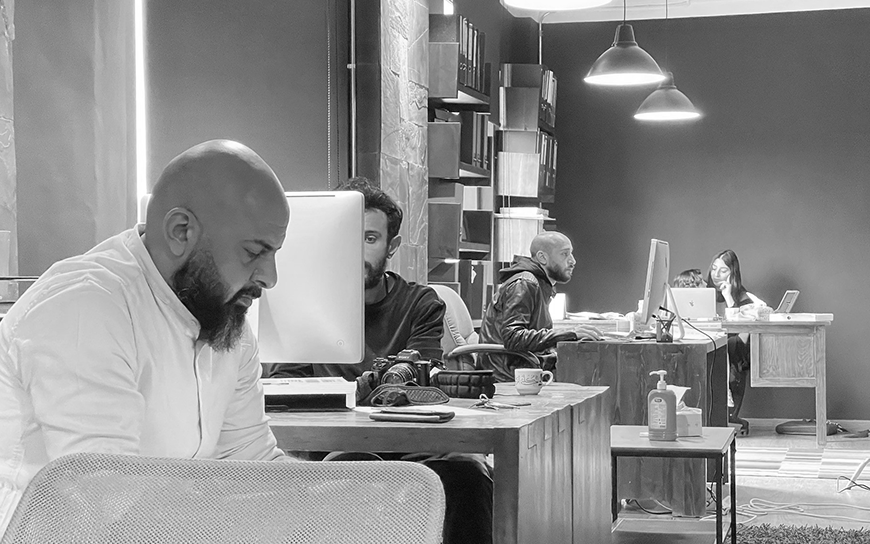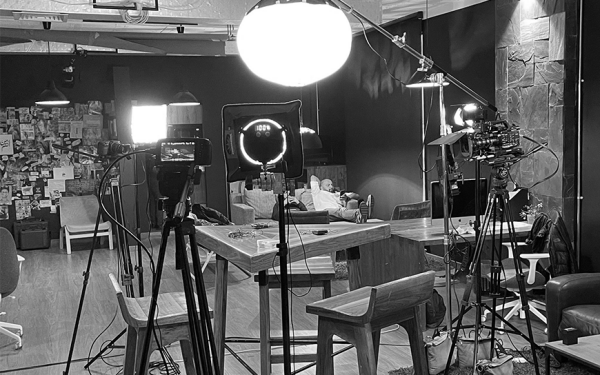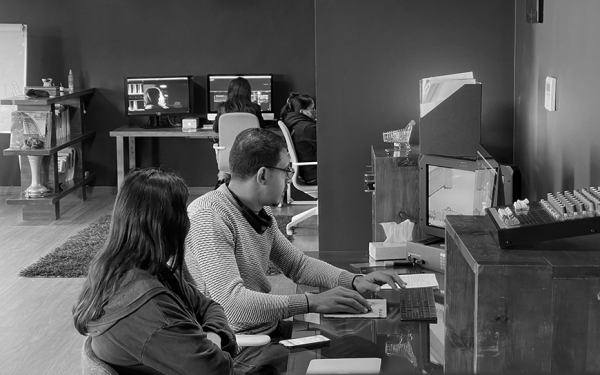
From the office of Aramram TV in Amman, Abdelsalem Akkad tells the story of what is considered the first Arab Web TV in Jordan: a Web TV that now counts 1.2 million followers on Facebook and 40,000 on Twitter.
A Lebanon native, Akkad is a veteran journalist, who has worked with prominent media channels in Europe, the United States and in the Middle East, producing entertainment programmes as well as documentaries from war zones.
Following a stint as a producer in Lebanon, he first arrived in Jordan in the early 2000s thanks to an assignment as a war correspondent in Iraq. He says it was his experience across various media ventures that inspired the launch of a new broadcast TV, and of experimenting with the concept, combining it with other forms of media.
Envisioning an alternative broadcasting platform
Akkad explains how he and his partner, Hams Rabah, saw young people losing interest in traditional media and that they both felt it was vital to provide good alternatives for this generation.
“We set about finding an alternative way of producing media products,” Akkad relates. “We wanted to capture young people’s interest. It was clear they felt that mainstream media were not addressing their struggles or the things they cared about.”
They were also keen to bring attention to topics related to youth in Jordan which might have been considered controversial within the local context, such as identity, political freedoms, minorities and sexual rights and to produce programming of interest to youth in the wider Middle East and North African region.
The pair launched their project in 2008, setting up Aramram Web TV as well as Greyscale Films, the company which produces content for the online outlet. As Akkad explains, it was important to establish these two organisations in parallel, so that profit made through Greyscale could be used to fund programmes for Aramram.
At that time, Aramram was considered controversial and unconventional due both to its unusual format and the content it produced. No online video content or Web TV existed at that time that addressed such issues – any discussion was confined to online blogs.
Akkad relates that the team experimented and tried out different formats for their shows ranging from reality-based videos, studio set-ups and long and short formats.
“We came up with a format of broadcasting one episode every two weeks, focusing on a different issue each time, followed by an online debate moderated by a digital journalist who also wrote the script. The moderator would ask viewers for their opinions on particular topics, they’d ask follow up questions, and then would give additional information and build on this conversation. Of course, the online discussions that followed the release of each video were a key part of the programme too,” he relates.
This format was well received and has opened up an avenue for youth to engage in online debates on issues relevant to their lives, with some discussion threads generating over a thousand comments.

A diversified show production
Aramram TV now has a diversified production of programming, producing shows on political, economic, social and cultural issues.
In November 2020, during the last parliamentary elections, the TV produced content focused on the elections, highlighted poll results and explaining the overall electoral process.
One of the station’s most successful shows, which ran for five years and is now back in production thanks to EED support, is the parliamentary watchdog 209 King Hussein Street, named after the street address in Amman of the Jordanian Parliament, the highest democratically-elected authority in the country. This show became hugely popular after the Arab Spring.
“In 209 King Hussein Street, we analyse and dissect laws from parliament. We also raise awareness about parliament’s legislative and oversight roles and how they affect people’s lives,” Akkad says.
“After 2018, when a huge wave of protests took place in Jordan, we faced pressure from the authorities and we pulled it from our schedule. When we were once again in a position to resume the show, we were going through some financially tough years, and the Covid-19 pandemic added to our problems. The EED grant helped us relaunch the show,” he states.
Another popular Aramram TV show explains the government’s economic policies, presenting what is often complex information in a fun and easily digestible format.
Strict fact-checking and analysis
As Akkad sees it, while Jordan has ‘freedom of expression’ on paper, in reality everyone, including journalists and other media outlets practice self-censorship. But he claims that at Aramram TV, this is not the case. “We rely on strict fact-checking and analysis for our content,” he says.
“Very few media outlets explain and dissect the laws properly. There’s lots of research out there, and while we also do this research, we find ways of communicating it in an accessible manner to a mainstream audience and to people from many parts of society,” he relates.
He admits that it can be difficult to carry out such analysis; accessing information can be challenging. Even research on legislation is complicated and requires a lot of digging. Such difficulties have meant that as part of Aramram TV’s long-term campaign, they are now promoting legislative transparency.
“We focus on solutions, highlighting main problem areas in different laws and the manner they impact different stakeholders and we offer practical solutions based on studies conducted by civil society organizations and think tanks. In this way, we like to think that we are valued as a credible and respectful actor,” says Akkad.

Exploring new topics for future production
Aramram TV has a busy schedule of production planned, with projects covering costs until October 2022. Among the topics they will cover over the next period is positive parenting, giving tips to parents on how to raise and educate their children, which is self funded.
They also plan a series on civic education to expose the different components that make up a nation state and the role of citizens in the public sphere, and another on social cohesion, highlighting positive examples of how people came together to support each other during the Covid-19 crisis.
The team is also hoping to address topics such as mental health, sexual and reproductive health and policy impact on youth.
In the future, Aramram TV is planning a more regional perspective for programming, an editorial policy that has always been at the back of Akkad’s mind. He and his production team are keen to look at best practices on key issues such as governance, gender equality, the environment, social and economic justice, and youth within the wider Arab world.
“What is clear for the future is that the content is growing together with our audience. We will continue to produce programmes that deal with issues people in the Middle East care about,” Akkad states proudly.